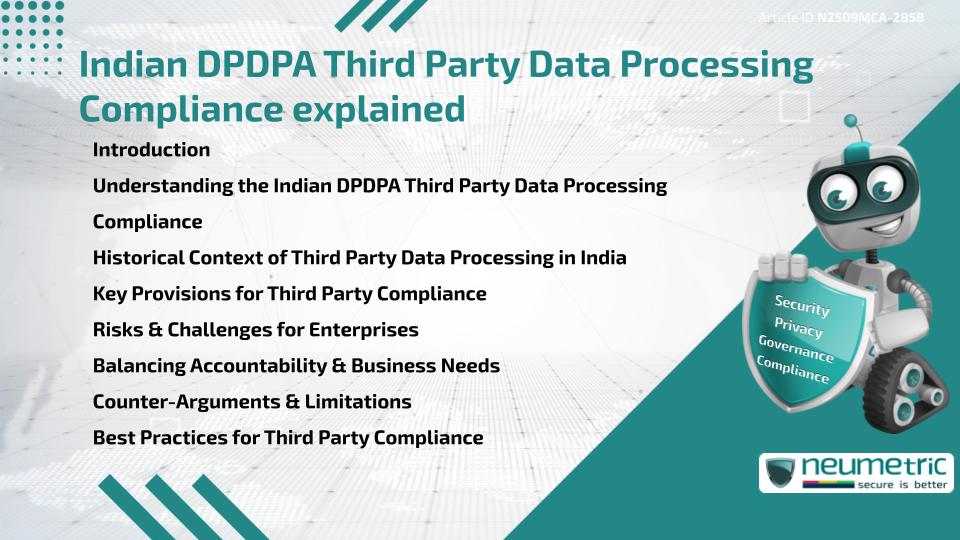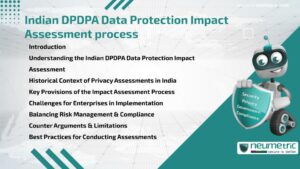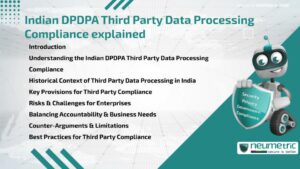Table of Contents
ToggleIntroduction
The Indian DPDPA Third Party Data Processing Compliance Framework outlines How Enterprises must manage & monitor Personal Data handled by External Vendors or Partners. The Digital Personal Data Protection Act [DPDPA] requires that businesses maintain Accountability, even when Third Parties Process Data on their behalf. This article explains the Background, Legal Provisions, Risks & Best Practices linked to Indian DPDPA Third Party Data Processing Compliance.
Understanding the Indian DPDPA Third Party Data Processing Compliance
When Enterprises outsource Services such as Cloud Storage, Payroll or Customer Support, they often involve Third Parties in Data handling. The Indian DPDPA Third Party Data Processing Compliance ensures that responsibility for protecting Personal Data does not shift away from the original Enterprise, also known as the Data fiduciary.
Historical Context of Third Party Data Processing in India
Before the DPDPA, India’s Regulatory environment mainly relied on the Information Technology Act, 2000 & Its Rules on Data Security. These Rules were vague on Third Party Accountability. Global Practices like the European Union’s General Data Protection Regulation [GDPR] influenced the introduction of strict Compliance Standards for Third Party Processors under the DPDPA.
Key Provisions for Third Party Compliance
Enterprises must:
- Sign binding Agreements with Processors defining Responsibilities.
- Ensure Processors adopt Security & Privacy Safeguards.
- Monitor Third Party Compliance through Audits & Assessments.
- Maintain the right to terminate Contracts for Non-compliance.
These measures prevent Enterprises from escaping Accountability when Third Parties mishandle Data.
Risks & Challenges for Enterprises
Implementing Indian DPDPA Third Party Data Processing Compliance presents several hurdles, including:
- Difficulty in Auditing International Vendors.
- Ensuring uniform Standards across diverse Third Party Relationships.
- Balancing Operational efficiency with strict Compliance demands.
- Managing Reputational Risks if Partners fail to protect Data.
Balancing Accountability & Business Needs
Enterprises often depend heavily on Third Parties to Scale Operations. While the Law requires stringent Oversight, businesses must find a balance between meeting Compliance obligations & maintaining Practical, Cost-effective Partnerships. This balance is especially important in Industries like Banking, Healthcare & Technology Services where Sensitive Data is routinely processed by Vendors.
Counter-Arguments & Limitations
Critics argue that the DPDPA could increase Operational costs for small & medium Enterprises that rely heavily on Third Parties. Another limitation is the lack of detailed sector-specific guidance on monitoring Third Parties, which may lead to inconsistent enforcement across Industries.
Best Practices for Third Party Compliance
Enterprises can adopt the following Practices to strengthen Compliance:
- Establish strict Contractual Clauses on Data Protection.
- Conduct regular Due Diligence & Risk Assessments.
- Require Certifications or Attestations of Compliance from Vendors.
- Implement Automated Monitoring Tools to track Third Party Data handling.
Conclusion
The Indian DPDPA Third Party Data Processing Compliance Framework places clear Responsibility on Enterprises for the actions of their Vendors. By adopting Robust Oversight, Clear Contracts & Continuous Monitoring, businesses can ensure Compliance while maintaining secure & efficient Third Party Relationships.
Takeaways
- The Indian DPDPA Third Party Data Processing Compliance ensures Enterprises remain accountable for Vendor actions.
- Binding Agreements, Audits & Secure Practices are mandatory.
- Enterprises must balance Compliance with Operational efficiency.
- Best Practices include Due Diligence, Certifications & Automated monitoring.
FAQ
What is Indian DPDPA Third Party Data Processing Compliance?
It is a Framework requiring Enterprises to remain accountable for Personal Data processed by External Vendors.
Why is Compliance important for Enterprises?
It prevents misuse of Data, reduces Risks of breaches & ensures businesses meet their Legal obligations.
Does the DPDPA apply to International Vendors?
Yes, if they process Data of individuals located in India, they must comply with DPDPA requirements.
How can Enterprises monitor Third Party Compliance?
Through Audits, Risk Assessments, Certifications & Automated monitoring Systems.
What challenges do Enterprises face in Compliance?
Enterprises often struggle with Auditing International Vendors, rising costs & maintaining consistent Standards.
Can Enterprises avoid liability by outsourcing Data handling?
No, Enterprises remain fully accountable even when Third Parties process Data.
Are there Penalties for Non-compliance?
Yes, Non-compliance can result in heavy Financial Penalties & Reputational damage.
References
- Digital Personal Data Protection Act – Ministry of Electronics & Information Technology
- India’s Data Protection Law Overview – Internet Society
- General Data Protection Regulation – European Commission
- Data Protection & Vendor Risks – Electronic Frontier Foundation
- OECD Guidelines on Privacy & Data Flows
Need help for Security, Privacy, Governance & VAPT?
Neumetric provides organisations the necessary help to achieve their CyberSecurity, Compliance, Governance, Privacy, Certifications & Pentesting needs.
Organisations & Businesses, specifically those which provide SaaS & AI Solutions in the Fintech, BFSI & other regulated sectors, usually need a CyberSecurity Partner for meeting & maintaining the ongoing Security & Privacy needs & requirements of their Enterprise Clients & Privacy conscious Customers.
SOC 2, ISO 27001, ISO 42001, NIST, HIPAA, HECVAT, EU GDPR are some of the Frameworks that are served by Fusion – a SaaS, multimodular, multitenant, centralised, Automated, CyberSecurity & Compliance Management system.
Neumetric also provides Expert Services for technical Security which covers VAPT for Web Applications, APIs, iOS & Android Mobile Apps, Security Testing for AWS & other Cloud Environments & Cloud Infrastructure & other similar scopes.
Reach out to us by Email or filling out the Contact Form…





